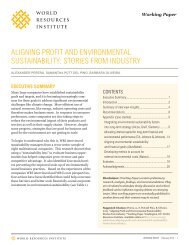Unleashing the Power of the Circular Economy
Unleashing the Power of the Circular Economy
Unleashing the Power of the Circular Economy
Create successful ePaper yourself
Turn your PDF publications into a flip-book with our unique Google optimized e-Paper software.
13<br />
13<br />
International<br />
independent<br />
systems are<br />
needed for<br />
data ga<strong>the</strong>ring<br />
and exchange,<br />
labelling and<br />
certification,<br />
impact<br />
assessment,<br />
standardisation<br />
and material<br />
pooling<br />
14<br />
<strong>of</strong> economic growth (GDP) in time. [92] As a start <strong>the</strong> Decoupling Index could<br />
be used. However, at <strong>the</strong> same time, efforts need to be made to also include<br />
and measure societal aspects, more environmental aspects and proximity.<br />
[93] Ano<strong>the</strong>r example is <strong>the</strong> Genuine Progress Indicator. This is one <strong>of</strong> <strong>the</strong><br />
first alternatives to GDP that was approved by science and used regularly by<br />
government and non-governmental organisations worldwide. The GPI is a<br />
variant <strong>of</strong> <strong>the</strong> Index <strong>of</strong> Sustainable Economic Welfare (ISEW), first proposed in<br />
1989. [94]<br />
Step 13 Establish international independent systems to organise<br />
materials flows<br />
Europe is strongly dependent on <strong>the</strong> import <strong>of</strong> material resources, and<br />
<strong>the</strong>refore particularly vulnerable for resource scarcity. The European<br />
Commission has only recently started to develop policies to deal with this<br />
vulnerability. [95, 96] Apart from Germany, no European country has yet made any<br />
significant steps to set up <strong>the</strong> institutions that form <strong>the</strong> basis for a prolonged<br />
focus on resource efficiency. [70] To govern issues concerning material<br />
resources related to data ga<strong>the</strong>ring and exchange, certification, impact<br />
assessment, standardisation and material pooling, international independent<br />
systems are required (see obstacles 6-11 in Appendix I).<br />
First, a solid knowledge base on <strong>the</strong> issues needs to be developed. Compared<br />
to energy, <strong>the</strong>re is strikingly little coordinated information ga<strong>the</strong>ring on<br />
material resource flows. With better understanding <strong>of</strong> <strong>the</strong> issues at hand, a<br />
roadmap for resource and impact decoupling can be developed.<br />
An information exchange system should be developed in which confidentiality<br />
issues are taken into account. [24] Next to this, specific collaborations could<br />
be set up to improve security <strong>of</strong> supply through materials pooling on a wider<br />
scale (as an expansion <strong>of</strong> step 6). To foster <strong>the</strong> ease <strong>of</strong> material exchange and<br />
reuse, standardisation needs to be organized. Certification is important in<br />
order to communicate and create accountability and credibility. Finally, <strong>the</strong>re<br />
should be independent auditing. In return for higher costs for management<br />
and planning (obstacle 5 in Appendix I), such systems enable better<br />
management <strong>of</strong> supply chains.<br />
27



